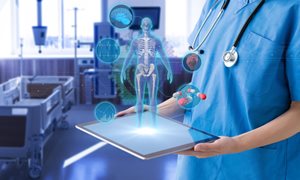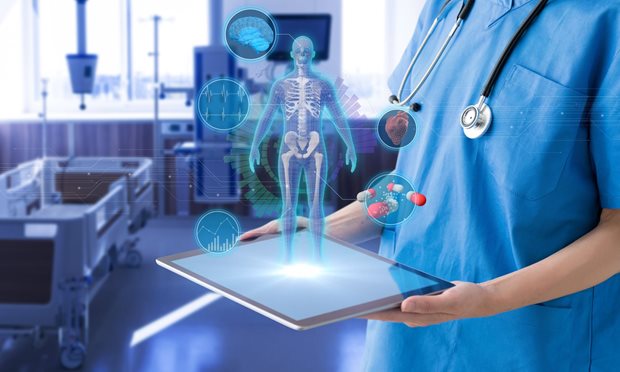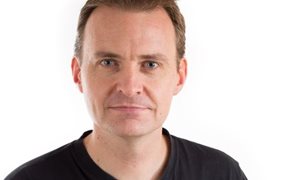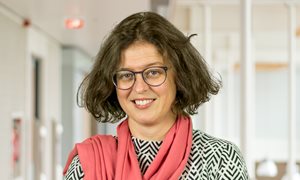

We are hiring! Top research positions in AI
Working at Radboud Artificial Intelligence for Health means: shaping the future of medical AI in a diverse, international and inspiring group of scientists! read moreWe are hiring! Top research positions in AI
Joining Radboud Artificial Intelligence (AI) for Health means becoming part of a vibrant environment that brings together specialists in AI technology developing and applying groundbreaking AI applications for healthcare. A rapidly growing group of international influential researchers with a leading position in the field of AI.
A unique ground for innovation in healthcare in a close cooperation between the Radboudumc and the Radboud University. All in the beautiful Dutch historical city of Nijmegen and in a dynamic, enjoyable and inclusive AI-team of about 60 highly skilled colleagues.
Therefore we are recruiting researchers in several areas at levels from associate professor in a career track to full professor and researchers in different areas at levels from postdoc to assistant professor.
Join our team!


Our research environment
Working at Radboud AI...

...means
Joining Radboud AI for Health means becoming part of a vibrant environment that brings together specialists in AI technology developing and applying groundbreaking AI applications for healthcare. A rapidly growing group of international influential researchers with a leading position in the field of Artificial Intelligence. A unique ground for innovation in healthcare in a close cooperation between the Radboudumc and the Radboud University. All in the beautiful Dutch historical city of Nijmegen and in a dynamic, enjoyable and inclusive AI-team of about 60 highly skilled colleagues.
Worldwide we are known as experts in analyzing X-ray and CT images with AI and for our exceptional knowledge and innovations in the field of analyzing microscopic images in Pathology using AI. We support doctors and healthcare staff in our clinic. In doing so, we make many processes better, more efficient and, in some cases, even automatic. Our vision is that the translation of AI-applications to the clinic could significantly improve the quality of care. Our common goal is the best care for patients and to make sure it is affordable, now and in the future. And in education we share our knowledge with our students: PhD’s and master students with a fresh pair of eyes in science.
Our ambition is to fully exploit the opportunities AI offers to make unconventional advances in health and healthcare. As a next step we are now investing in new ‘talent’ in Radboud AI. Therefore we are recruiting researchers in several areas at levels from associate professor in a career track to full professor and researchers in different areas at levels from postdoc to assistant professor.
Working at Radboud AI for Health means: shaping the future of medical AI in a diverse, international and inspiring group of scientists!

...requires
Participating and taking the lead in unconventional research in AI. read more...requires
Your position at Radboud AI for Health requires that you are a specialist in AI technology and able to take the lead in unconventional research in AI. Therefore you already have a track record in excellent and innovative research linked to AI in your specialism. Main part of your job will be doing research in your field in close cooperation with our medical staff and so contribute to AI innovations in healthcare.
This also requires that you are able to adequately analyze and map the needs and challenges of healthcare in your field and to connect your efforts in research properly to this. At the same time you are driven to participate in the education and to support your (PhD) students and you are an inspiring teacher. It comes natural for you to share your knowledge and experience with our PhD’s and master students and drive them to unprecedented achievements in AI for health. Your main goals in education and support are: further personal and professional growth of our students and motivating PhD’s in research to even outperform you as an authority in medical AI.

...brings you
Being part of a largely unexplored and groundbreaking technical innovation in AI for healthcare. read more...brings you
Joining Radboud AI for Health means taking part in the development and application of a largely unexplored and groundbreaking technical innovation in AI for healthcare. Regardless of your specialism or exact position, you will become one the founders of medical innovations that will impress the world and will directly affect the quality of care for patients. Together with our group of international and excellent researchers that will bring out the best in you.
You will work in an inspiring and dynamic environment without limits and with all the resources you need to put your mark on your scientific discipline. A motivated, involved and inclusive team of highly talented investigators closely working together. Inspiring colleagues from all over the world who will welcome you and will also stimulate your further personal development by sharing their ideas, knowledge and experience with you. Radboud AI for Health is an international oriented organization that will, if necessary, give you all the support you need to start in your new and challenging career in Nijmegen.
Inspiring colleagues you will work with

Colin Jacobs Assistant Professor Medical Imaging
In conversation with ... Colin Jacobs
Colin Jacobs is Assistant Professor within the Department of Medical Imaging of the Radboud University Medical Center. Within the Diagnostic Image Analysis Group, he leads the research line on lung cancer image analysis. We are curious to know why he chose Radboudumc exactly and why the facilities for a researcher in the field of Artificial Intelligence (AI) are special here.
Why did you continue your career at the Radboudumc?
“Radboudumc offers me a unique environment to conduct my research on artificial intelligence for lung cancer. Early detection and treatment of early stage lung cancer is a spearhead of our hospital, where there is a good collaboration between the Departments of Medical Imaging, Pulmonary Diseases, Radiotherapy, Cardio-Thoracic Surgery, and Medical Oncology. Furthermore, within the Diagnostic Image Analysis Group we have built a staff with broad knowledge in the field of artificial intelligence in healthcare and together we have built a strong foundation to support our research.”
And how do you like that now, what has it given you to work in this very environment?
“For me, it is crucial that I can see and optimize the impact of my research on healthcare. A lot of research around artificial intelligence takes place at technical universities, and that makes it harder to optimize the applicability of the research. By actually working in an academichospital and doing research, the lines to the clinic are much shorter, and it provides domain knowledge that allows the research to be more quickly translated to the clinic.”
And what does the Radboudumc have in this AI ecosystem that makes it unique to you?
“The Radboudumc has made AI a focus within the organization. As a result, the hospital is at the forefront of AI for healthcare. Examples include the two Nijmegen spin-offs Thirona and Screenpoint, and the AI for Health lab.”

Alain van Gool Professor Personalized Healthcare
In conversation with ... Alain van Gool
Alain van Gool is professor Personalized Healthcare and heads the Translational Metabolic Laboratory at Radboud University Medical Center, with a strong passion in the application of biomarkers in translational medicine and personalized healthcare. His professional background since 1991 is a mix of academia, pharmaceutical industry, applied research institutes, university medical centers. He has been leading technology-based biomarker laboratories, cross-functional expert teams, therapeutic project teams and public-private consortia. We are curious to know why exactly he chose Radboudumc and why the facilities for a researcher in the field of Artificial Intelligence (AI) are special here.
We are curious, why did you continue your career at the Radboudumc?
“After years of working in academia, industry and research institutes, an umc environment is the ideal place where research, innovation and education meet patient care. This makes it an ideal environment for me because it allows you to have a direct impact on people's lives and health. The person-centered and innovative approach of the Radboudumc also appeal to me greatly. Moreover, it is a very accessible environment where you can work together with colleagues in an approachable and pleasant way.”
And how do you like that now, what has it given you to work in this very environment?
“I have been working with molecular biomarkers and omics data for many years, where it is clear that the real added value comes only when we can combine it with other personal data such as health history, lifestyle and environment. That goes far beyond regular statistics and I expect a lot from AI as a method to create more knowledge there for more impact on healthcare. Because the Radboudumc is leading in the AI field, it is very interesting for my work to join this and explore the possibilities.”
And what does the Radboudumc have in this AI ecosystem that makes it unique to you?
“In the Radboud AI ecosystem with colleagues from the Radboudumc and other faculties, we bring together a lot of AI knowledge from various fields that can accelerate methods and applications. And it is precisely this acceleration that can have an impact on patient care, and that is what we are doing it for, after all.”
Join our team!

Bram van Ginneken Professor Functional Image Analysis
In conversation with ... Bram van Ginneken
Bram van Ginneken is Professor of Medical Image Analysis at Radboud University Medical Center and he chairs the Diagnostic Image Analysis Group. He also works for Fraunhofer MEVIS in Bremen, Germany, and is a founder of Thirona, a company that develops software and provides services for medical image analysis. Also, he is a member of the Editorial Board of Medical Image Analysis. He pioneered the concept of challenges in medical image analysis and knows the Radboudumc AI environment very well. We are curious to know why exactly he chose Radboudumc and why the facilities for a researcher in the field of Artificial Intelligence (AI) are special here.
We are curious, why did you continue your career at the Radboudumc?
“In 2010 I came to Radboudumc because there was an ambition at the Radiology Department to set up a strong group in the field of machine learning. I was doing a lot of research myself on detection of tuberculosis on chest radiographs and lung cancer on CT scans, and at Radboudumc Nico Karssemeijer already had a strong group to analyze mammograms from breast cancer screening. We were the first group in the Netherlands with two professors in the field of medical image analysis. That, of course, made it special for me to get to work here. Together we were also able to develop computer algorithms in all kinds of other fields, for example in ophthalmology, and for early detection of prostate cancer with MRI, a field in which a lot of pioneering research is being done at Radboudumc.”
And how do you like that now, what has it given you to work in this very environment?
“A huge strength is the ability to use clinical data from practice for research. The procedures for arranging all the permissions are set up well, and there is a willingness of almost everyone in the house to work together to collect data and build computer algorithms from it. We have also been able to set up several companies that are very successful, and my collaboration with Fraunhofer MEVIS, a large research institute and Mevis Medical Solutions, a company, both from Bremen, is actively supported. The motto of Radboudumc is a significant impact on healthcare and you notice that in everything we do. You are encouraged to do more than just write publications and also to bring your research results to the market so that patients can really benefit from it.”
And what does the Radboudumc have in this AI ecosystem that makes it unique to you?
“In 2010 we had a group of 10 researchers. Now we have over 60 researchers, making us the largest group of this kind in Europe. And we have started two companies where more than 50 people are already working. Two new startups are in development. That shows that there is room to grow quickly here if you are successful and ambitious. I also see this in several other areas in which our hospital is leading the way. In recent years, more and more departments at Radboudumc are living the idea that AI and digitization can really improve care. And we are on a campus with a broad university where the number of students in AI and Data Science is growing enormously and almost every faculty is working on AI from its own perspective, from literature to law, from philosophy to astronomy. Furthermore, we have the Donders Institute next door, a top global research center where they figure out how the human brain works and that leads directly to inspiration to improve the artificial intelligence of computers as well.”
Join our team!

Iris Nagtegaal Professor Gastrointestinal Pathology
In conversation with ... Iris Nagtegaal
Iris Nagtegaal is professor of Gastrointestinal Pathology at the Radboud University Medical Center. Her research focused on colorectal cancer, where she works at the intersection of histology, molecular biology, epidemiology, microbiome and computational pathology. Also, she is heading the Radboudumc research theme Tumors of the Digestive Tract. We are curious to know why exactly she chose Radboudumc and why the facilities for a researcher in the field of Artificial Intelligence (AI) are special here.
Why did you continue your career at the Radboudumc?
“After my postdoctoral fellowship of the Dutch Cancer Society, where I worked in Houston (USA) and London (UK), I wanted to return to an environment where I could develop my own research line, with input from clinical collaborators as well as translational researchers. The possibilities in the Radboudumc are optimal: we have a dedicated Laboratory for Tumor Genetics as well as the larges Diagnostic Image Analysis Group In Europe. Here I can combine the best of both worlds and make significant progress and impact in patient care.”
And how do you like that now, what has it given you to work in this very environment?
“My research group is the best! It is a diverse, multidisciplinary, international group, that consists of many curious, ambitious people, that are open to novel ideas and techniques. We are really bringing biology and Atificial Intelligence together. By using large clinical and pathological datasets, developing novel algorithms and adding innovative biological insights, we have direct impact on patient care. That is a unique setting, here at the Radboudumc.”
And what does the Radboudumc have in this AI ecosystem that makes it unique to you?
“While my own research focus is not on AI, I work closely together with the Digital Image Analysis Group, which gives me the opportunity to follow the latest innovations. By working together, we can focus on the most relevant areas in cancer research and diagnostics. The multidisciplinary approach really allows us to make a real impact on healthcare.”
Join our team!

Jeroen van der Laak Professor of Computational Pathology
In conversation with ... Jeroen van der Laak
Jeroen van der Laak is Professor of Computational Pathology at Radboud University Medical Center. He is also guest professor at the University of Linköping, Sweden. He studied the use of computer software for analysis of medical images for almost 30 years. We are curious to know why exactly he chose Radboudumc and why the facilities for a researcher in the field of Artificial Intelligence (AI) are special here.
Why did you continue your career at the Radboudumc?
“I studied computer science and have always had a broad interest. Combining a strong academic environment with a medical center, Radboudumc allowed me to apply my skills to medical research, where the work you do, can be of help to people with sometimes severe illnesses. For me, this makes the work much more rewarding.”
And how do you like that now, what has it given you to work in this environment?
“Innovation is one of the core values of Radboudumc. It is a great place to work, very multidisciplinary, which means that you’re not an isolated researcher. You interact on a daily basis with your colleague researchers, clinicians, lab technicians and many others. Seeing the bigger picture also helps to work on real solutions for real problems, and get the right people and access to important data to accomplish impact for patients.”
And what does the Radboudumc have in this AI ecosystem that makes it unique to you?
“In the last 10 years, we have grown into a mature AI research environment, with a large group of AI researchers, a dedicated team of research software engineers, and all the required storage and compute hardware. We have collected valuable data sets and, in collaboration with our clinicians, enriched these with annotations of all sorts. This creates a highly stimulating environment, where everyone is stimulated to learn and grow and develop their own line of research.”
Join our team!

Otto Boerman Professor Radiochemistry
In conversation with … Otto Boerman
Otto Boerman is Director of Facility for Research with Laboratory Animals and professor Radiochemistry at the Radboud University Medical Center Nijmegen. In addition, he chairs the Board of the Radboudumc Technology Centers. The Radboudumc technology centers are an access point for technological expertise, high-end equipment and biobanks. We are curious to know why he chose the Radboudumc environment as his workplace.
Why did you choose to continue your career at Radboudumc?
“This has been a very conscious choice for me. The Radboudumc is a more than excellent environment to do biomedical research, with excellent research facilities and a group of inspiring colleagues. For my field of research, that is what drew me here.”
When you look at the AI ecosystem, what makes it unique for researchers?
“The Radboudumc AI group is among the absolute best in the world. It is exciting to see how the different AI research groups are currently making important contributions to actually make healthcare better. The applications are developed in close collaboration with clinicians and tested in clinical practice. That is unique.”
Join our team!

Geert Litjens Professor Computational Pathology
In conversation with ... Geert Litjens
Geert Litjens is a Professor of Computational Pathology at the Radboud University Medical Center. His research is at the intersection of machine learning, medical imaging, and oncology. Besides he is co-chair of the Computational Pathology Group, which develops automated machine learning systems for cancer detection, biomarker discovery and quantification, and improved prognostication. We are curious to know why exactly he chose Radboudumc and why the facilities for a researcher in the field of Artificial Intelligence (AI) are special here.
We are curious, why did you continue your career at the Radboudumc?
“After my postdoctoral fellowship in Heidelberg, I wanted to return to a clinical environment where you can directly put your AI research into practice, but where you can also discover relevant applications by interacting with the most important end users: the doctor and the patient. And the Radboudumc is such an environment.”
And how do you like that now, what has it given you to work in this very environment?
“It has mainly given me the opportunity to work in an interdisciplinary environment where your research can have a direct impact. In addition, as a researcher in the field of Artificial Intelligence in the medical sector, access to good data is essential to be able to answer relevant questions, and this is well arranged within the Radboudumc.”
And what does the Radboudumc have in this AI ecosystem that makes it unique to you?
“My own research area focuses on applications of AI in pathology, so on microscopic images of tissue from cancer patients, for example. Radboudumc is unique in having a complete digital infrastructure in the pathology department, but in doing so it also has a research group of more than 60 researchers in the field that is world-leading in terms of AI for medical images. This together provides a critical mass that allows us to make a real impact on healthcare.”
